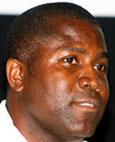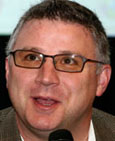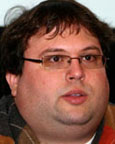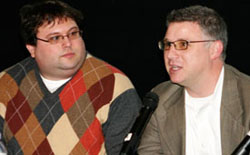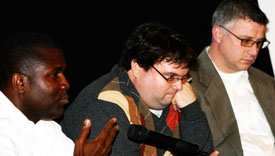| The Campaign and the Media 2 |
|||||
|
Thursday, Nov. 13, 2008 Marc Ambinder is an associate editor at the Atlantic and a contributing editor to both the Hotline and National Journal. He blogs at marcambinder.theatlantic.com. Cyrus Krohn is director of the Republican National Committee's eCampaign Division. He joined the RNC following two years at Yahoo! as director of content production and election strategy. Previously, he was Slate’s first employee and then publisher while the webzine was owned by Microsoft. Ian V. Rowe oversees MTV's on-air, online and off-air pro-social campaigns including the 2008 Choose or Lose campaign in which a team of citizen journalists submit weekly campaign reports online and via mobile technologies. Moderator: Henry Jenkins is co-director of Comparative Media Studies and the Peter de Florez Professor of Humanities at MIT. His most recent book is Convergence Culture: Where Old and New Media Collide. Co-sponsors: Center for Future Civic Media and Technology and Culture Forum. A webcast of The Campaign & the Media, 2 is now available. A podcast of The Campaign and the Media, 2 is now available. By Helene Moorman Ian Rowe shared the results of a survey in which young people were asked to cite three brands they associate with each of the presidential candidates. For Barack Obama, the most common answers were Apple, Nike, and Coca-Cola. For John McCain, they were Exxon Mobil, Tommy Hilfiger, and Bengay. These amusing responses, said Rowe, show how the young audience thought about the candidates. MTV discovered in 1992 that presidential politics were a mystery to most young people. Candidates assumed young people wouldn't vote, so they didn't make an effort to address issues that were important to them. MTV’s Choose or Lose campaign was introduced to help remedy this problem, and there has been a large increase in young voters since its inception. Cyrus Krohn said his core interest is the intersection of technology and politics. After 12 years of helping politicians utilize Microsoft's and Yahoo's media products to influence elections, he decided to become more directly involved in the 2008 campaign by becoming the e-campaign director for the Republican National Committee. Moderator Henry Jenkins asked the panelists how new media made a difference in this election and what criteria should be used to measure that difference. Marc Ambinder noted that during the election many old media platforms attempted to use new media outlets to reach audiences. Therefore, it's important to distinguish between independent new media and new media formats and appeals that were generated by old media. According to Rowe, the best way to determine the effect of new media is to look at who voted. Twenty-four million 18-29 year olds voted this year, an increase of nearly four million from 2004. Of those young voters, 70 percent chose Obama. The Obama campaign's use of new media played a major role in that outcome by giving every supporter a way to participate. For example, they created a website called Fight the Smears, which addressed the negative rumors about Obama. The site itself was a clever idea, but it’s most powerful feature was a Facebook widget that anyone could use to direct others to the anti-smear site. Like many of Obama’s digital strategies, this feature gave every supporter the ability to help protect and advance the Obama brand. The McCain campaign used some of these strategies as well, but Obama’s digital campaign was far more nuanced and technologically advanced. Krohn noted that some of Obama's tactics were based on earlier Republican efforts such as the GOP Team Leader program of 2004, which aimed to create a social network for the Republican electorate. The RNC was also first to compile a massive voter database containing information about voters’ behavior that could be used to target messages to individuals in their homes. Ambinder said that some of the success of both the Bush campaign in 2004 and the Obama campaign in 2008 was a result of the merging of traditional marketing techniques with new technology. Research shows that people are more easily persuaded by others who look and live like them, and the Bush campaign took advantage of this in 2004 by organizing its volunteer canvassing into "affinity groups." At that time, the Democrats simply didn't have the capacity to organize at that level, but this year the Obama campaign had $630 million dollars and more advanced technology. They built on earlier Republican ideas by targeting their marketing to specific kinds of people. Krohn added that some of the campaigning techniques in this election were remarkably efficient. For example, both parties used Facebook applications that allowed supporters to generate lists of people to telephone on behalf of their candidate. Campaign officials also had access to social network data mining companies, which supplied information on individuals in the voter database as well as their friends. Asked whether new media tactics engaged constituencies other than young voters, Rowe cited an occasion on which Obama reversed his position on privacy legislation after winning the Democratic nomination. Thousands of supporters complained on his website, and Obama responded by blogging about the reasoning behind his actions. Even though he stuck to his position, his readiness to enter into a dialogue with his dissenting constituency reinforced his democratic message, his commitment to bring ordinary citizens into the political process. Rowe stressed, however, that the technology in itself was not responsible for this; it simply strengthened a candidate who already had a strong, consistent message. The African-American community was also influenced by the Obama campaign's use of technology, said Ambinder. In South Carolina, there was resistance to Obama's candidacy among older African-American women, who simply didn't believe that a black man could actually win. Michelle Obama had directly addressed this subject in a speech, so in order to reach these women, the campaign sent volunteers out to beauty salons with video and audio recordings of it. Jenkins asked whether new media has had negative effects on the campaign, and what the limits and challenges of these technologies are. For the candidates, said Rowe, the challenge was making the new media work for them. Obama took advantage of the internet's power to disseminate information quickly, using the Fight the Smears website. But the Republicans didn't manage to do that effectively for Sarah Palin. Many rumors about her were carried on the internet, and the campaign failed to use that situation as an opportunity to attack Obama and his supporters. According to Rowe, Obama's popularity-- particularly among young people-- wasn't inevitable, but he took better advantage of new media than McCain and was able to reach many of the people who use these technologies in their daily lives. Ambinder disagreed, saying that John McCain represents an older generation's conception of America, so the outcome among young voters was fairly inevitable. Given this, the campaign's decision not to spend as much effort as Obama on things like social networking sites might have been prudent, he said. Ambinder also pointed out that the McCain campaign initially set up a whole team of researchers and lawyers to defend Palin from inaccurate rumors, but they encountered many problems. They couldn't keep track of what was being said, there was often some truth in the rumors, a lot was not known about her background, and Palin herself exaggerated the truth in certain instances. Krohn brought up resource allocation as another challenge to campaigning in the new media landscape. The Republicans had much less money than the Democrats in this election. One of the early resource decisions was not to treat the internet as a priority. In Krohn's opinion, that was a mistake because the internet is the most efficient way to reach people. Krohn also raised the issue of online donations. They can be a very significant source of funding for a campaign, but there are few regulations concerning how transparent the transactions are and how the money can be used. This is something the Federal Elections Commission should consider more closely monitoring in future campaigns, he said. Ambinder said that increased partisanship is a negative consequence of new media. Political websites tend to inspire partisan clustering, even if they are not actually biased to one side. The Atlantic's blogs are an example of this-- half of the writers are conservative, but most of the readers come from the left. Jenkins' final question to the panelists concerned the ways in which new media can and will be used for governance. According to Krohn, digital technologies have opened party platforms to a much wider group of voters. In the past, a small portion of the population participated in creating the parties’ platforms by attending regional hearings, but new websites are making it much easier for anyone to submit opinions about what their party should represent. Ambinder said that new media technologies will empower citizens to hold the incoming administration to its promises about transparency. People can demand that items such as the defense budget be posted online, and it will be interesting to see whether Obama sticks to his promise to use the internet to make government more transparent and responsive to ordinary people. Audience Discussion QUESTION: How have new media technologies elevated the discourse of presidential elections? ROWE: New media isn't immune to politics. Negative campaigning works, and technology won't change that. In fact, it gives it more outlets. I don't believe it will elevate the discourse. AMBINDER: One example comes to mind. The Obama campaign spent a lot of time through new media technologies explaining to voters why Hillary Clinton's gas tax holiday proposal was a gimmick, and it actually had an effect on opinion. That at least shows that new media distribution channels are capable of communicating intellectual arguments. Unfortunately, we haven't seen many examples of that, but the possibility is there. KROHN: New media exacerbates the problem of negative campaigning because the community at large can act in a completely decentralized way. For example, at the beginning of his campaign, John McCain said that Reverend Wright was off-limits for discussion, and he never brought him up. But the subject was everywhere in the blogosphere. QUESTION: In what other ways might the incoming administration use new media for governing? AMBINDER: Obama wants to produce a weekly YouTube address instead of the traditional radio address. The White House will probably establish a blog of some kind. Obama has mentioned broadcasting regulatory hearings over the internet and allowing citizens to comment on them in real time. And a website that allows people to launch petition drives is being considered. ROWE: There's talk of creating a cabinet-level position for a chief technology officer, which would be extraordinary because it would force every area of government to consider how to use technology to run more efficiently. QUESTION: By using these technologies to such an extent, don't we risk alienating people who don't have access to them or choose not to use them? ROWE: Yes, it's similar to the challenge of overcoming the digital divide, where ways to engage low income communities had to be created. I think it comes down to the high-level CTO position and achieving one hundred percent broadband penetration across the country. QUESTION: Are new technologies truly enabling citizens to drive the political conversation, or is it heavily manipulated by the campaigns and the mainstream media? JENKINS: On the day on which she was named the VP candidate Sarah Palin’s entry in Wikipedia was one of the most heavily viewed pages in Wikipedia’s history. According to the history page, sixty to seventy percent of the content was written just before the announcement. We don't know who wrote it, but circumstantial evidence suggests it was someone with the McCain campaign. That could be seen as manipulation, or it could be seen as simply tactics. ROWE: It's a hard question because a successful campaign is always a manipulation of the media. The only way to win an election is to create effective ways to tell the story you want people to hear. QUESTION: Have the tools we've been talking about made people more likely to judge political candidates on personality rather than policy? ROWE: We live in a celebrity culture, and MTV's audience did feel a certain kinship with Obama. But there's no doubt that issues played a major role in his popularity. Seventy-four percent of eighteen to twenty-nine year-olds reported that they personally know someone who fought in Iraq or Afghanistan. Issues like that are very important to them, and I don't think that personality trumped them. QUESTION: How much longer can corporations and the major parties keep the control of debate questions out of the hands of the public? AMBINDER: I don't think you're ever going to convince the old media to completely relinquish control over the debates. The Commission on Presidential Debates is a joke. It's disconcerting to have a private corporation have so much influence over such important moments in our democracy. KROHN: I agree. The fact that the commission did such a poor job of utilizing technology to bring citizen voices into the debates was the most disappointing part of this campaign cycle. QUESTION: What are the implications of the novel ways to donate money that new technologies are creating? ROWE: Outside of the political arena, I'm very excited about micro-philanthropy, where an individual can make a personal donation to another individual. On a site like Kiva.org, the recipient might be an entrepreneur in another country who needs $250 to launch a business. There are also opportunities for education. We're working with the Gates Foundation to create an online scholarship marketplace, where anyone can donate money in the form of a scholarship to a young person in danger of dropping out of school. These are the kinds of efforts that start to solve the world's most intractable problems. Near the end of this forum one question generated a compelling demonstration of the potential power of the internet in American politics. A questioner demanded to know why no one had acknowledged that Obama was not an American citizen. Jenkins displayed the Fight the Smears website on the large screen behind the panelists, clicking on a link responding to this specific rumor. A facsimile of Obama’s birth certificate instantly appeared. |
|||||

